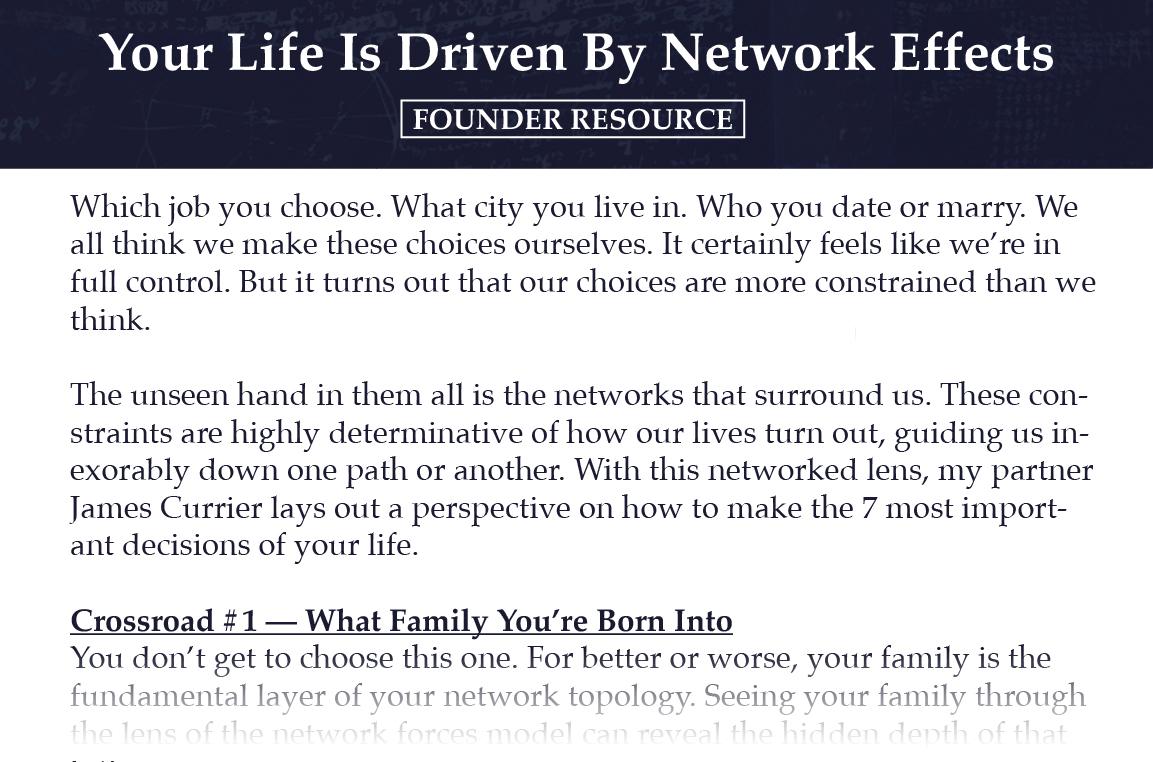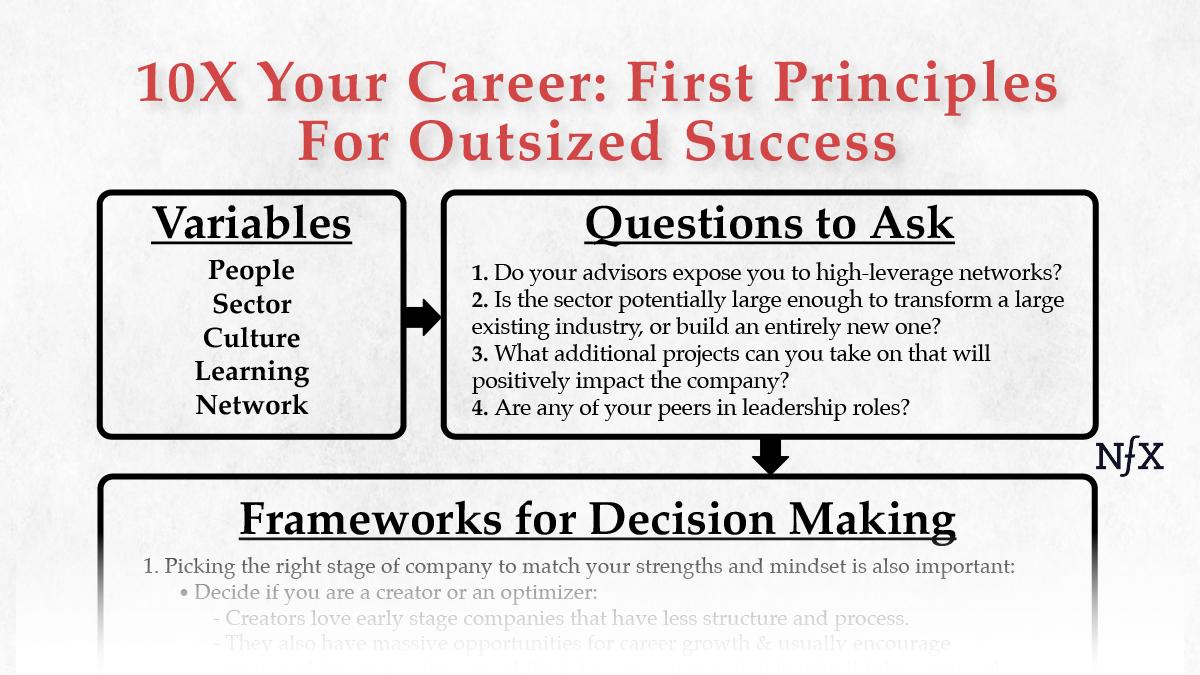

I was recently asked: How did you get to where you are today?
Instead of answering chronologically, as most do, I started to think less about the companies I ran and more about how I built my career — and what first principles guide me along the way. What frameworks do I use to make decisions? What are the driving forces? To what extent has my career so far come from good fortune vs. good choices?
Not many people are intentional early on about their career decisions. It’s easy to jump from one place to the next without thinking about the overall direction. As a result, our school, network and career choices often look like a scatter graph, rather than a plane taking off up and to the right.
Yet, today, career stress is at an all-time high. The pandemic alongside social and political upheaval has caused economic and employment whiplash for many. The world has experienced the dissolution of certain jobs, the mass creation of new ones, and a hyper-competitive market for high-paying tech roles. College campuses have lost their allure, geographic lines have blurred, and nothing appears certain anymore.
As a result, many people are asking:
- What am I doing with my life?
- Am I doing the right work with good people?
- Where am I going from here?
Finding your own 10x career path requires rigorous decision-making and counterintuitive reasoning. A 10x career is one where you reach escape velocity and become truly high flying — with compounding opportunities for personal growth, societal contributions, and strong financial outcomes. What these people know, that others do not, is that every decision you make along the way should optimize for learning, speed, and network growth — which are all-powerful functions of personal and career growth.
This essay is part first principles thinking and part a reverse-engineered rendering not just of my own success, but of what I have observed while managing thousands of people at Trulia, and learning from many more along the way. I wrote this as a guide for anyone facing early-stage career decisions, including:
- Young Founders who are running startups
- Those who are thinking of joining a startup
- Tech employees, even at larger companies
- People early on in their careers, startup or otherwise
Above all, consider this strange time in our world an opportunity to pause a moment and articulate what you’re good at, what makes you happy, and what the world needs. Your path to 10x success is likely at the intersection of all three.
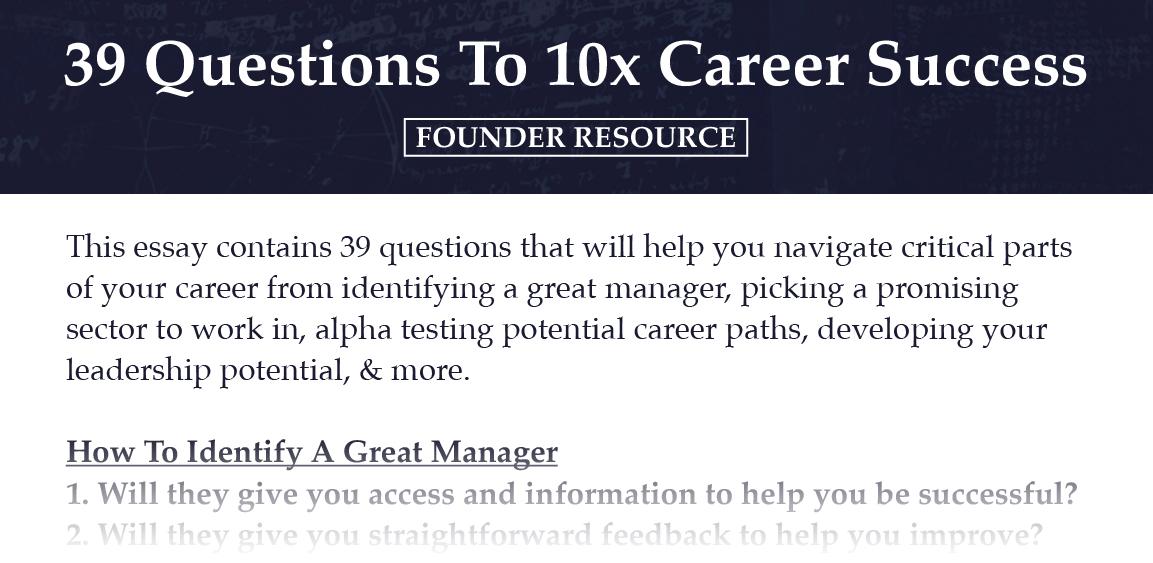

How to Choose Your First Job
Early choices about where you work will determine how you work. You will pick up skills, styles, and mindsets from the people around you. In this way, your first jobs really form your career DNA.
When in doubt, here is a mantra for deciding where to go for your first job (and beyond): Follow people and follow momentum.
Those are the two key forces for creating 10x careers. When you find the right people to work with, they will help you maximize your learning and your access to networks. When you find momentum — in the form of a rapidly-growing sector — you will maximize your opportunities not just for career growth, but for career leadership.
If you have to make a tradeoff, optimize for people over company. I’d always encourage you to join an amazing person at an unknown company over working for a mediocre person at a seemingly good company.
Optimize for network (people)
Traditional wisdom says you should pick your first job based on the highest income, or the one that you’re most passionate about, or the skills you’ll learn. As my NFX partner James Currier wrote in Your Life Is Driven By Network Effects, “This is flat wrong. In your first job, go work with people whose career path you want to emulate. Optimize for network.”
When you find the right people to work with, you will amplify nearly every aspect of your career and your life. Being around good, smart, unusually insightful people will accelerate your own learning curve. They will provide access to their networks and tribes, the benefit of which cannot be overemphasized. A great boss or group of colleagues can bring both direction and velocity to your career.
How to identify a great manager
A healthy manager-employee relationship is a two-way street: you make managers look good by doing high-quality work for them, and in turn, they open doors and opportunities for you. After earning their trust, great managers often become lifelong advisors and friends — even after you’ve switched jobs or companies.
Here are questions to ask yourself, to identify whether a manager or mentor is someone who can maximize your learning and also help build your network:
- Will they give you access and information to help you be successful?
- Will they give you straightforward feedback to help you improve?
- Has this person been exposed to experiences or environments that you can learn from?
- Does this person have energy, intellect, likability, and a spirit of mentorship?
- Has this person already achieved what you think is a high level of success, or demonstrates a high level of ambition that you think will lead to success?
- Does this person easily offer up interesting introductions that could be helpful to you? When asked for intros, do they generally offer them up?
- Does this person have a large network?
- Will the manager help you shine (not just take credit) and push you to interface with senior people?
Don’t pick a company, pick a sector
Contrary to popular advice, don’t try to pick a company. Being attracted to momentum is good, but identifying the right rocketship company to join before everyone else knows it’s a rocketship is extremely hard to do.
Instead, find a rapidly-growing rocketship industry. Look for a technology that has an explosive pace of progress, innovation, and the potential to transform lives. AI, for example, is in the early stages of growth. It’s in an exciting innovative stage, with a good number of new companies and access to capital, and will be universally transformative.
Often the best opportunities come at the intersection of two quickly evolving sectors. AI and medicine, for example. Or urban mobility and electrification. Or computational biology and genomics.
When you pick a sector or intersection that is fascinating to you, even if your first role or the first company you work for doesn’t turn out to be a breakthrough success, you will still be on the road to establishing learning and expertise in a high-growth field alongside hopefully other exceptional people.
How to identify a promising sector
Here are questions to ask yourself as you determine a sector’s potential — is it actually exploding in growth? — as well as your role within it:
- Is interest via Google Trends growing?
- Are there a good number of startups entering the field?
- Are there many investments happening in this sector? How many are rapidly scaling up to series A, B, C? This will show investor interest and confidence in leading companies and therein the sector.
- Is the sector potentially large enough to transform a large existing industry, or build an entirely new one?
- Are there catalysts to help this industry grow into a large one? Are technology, economic and cultural forces combining, or on the cusp of doing so, to enable explosive growth?
- Is this an area where there is growing interest from PhDs and doctoral students, where innovations will trickle into the marketplace over years to come and generate true scientific breakthroughs?
- How sustainable is this industry? Will it face potentially insurmountable challenges from incumbents or governments?
- Can you rapidly learn something new, or master something in this sector that no one else knows?
- Are the core skills needed to be successful in this sector potentially transferable to another sector?
- Will you be building valuable skills that are not readily available elsewhere? One proxy for this is if there are no undergraduate courses on this topic yet.
Alpha testing for possible careers
It’s not easy to find out what you like to do, what sectors are interesting, and what kind of company you enjoy working in until you’d have some experience and some insight about yourself. To make a software analogy, the very earliest stages of your career are like the alpha for a product (where you are the product). Develop a quick series of iterations and test the market before a big Launch.
Internships and other shorter-term engagements or consulting work are great for this alpha testing mentality. Project-based jobs allow younger workers or students to gain precision about what it is they want to do, at very low risk, without wasting time somewhere that’s not a good fit.
For example, as a college student, I did three different internships. One with a big tech company, one with an investment bank, and one with an Internet startup. I loved the startup internship the most and knew that would be my career path. This made it easy for me to hunt for a job after graduation because I already knew what I wanted. It was a simple decision to make when I joined a great group of people founding a company called lastminute.com an iconic European web 1.0 company that was later acquired for over $1BN.
Are you more creator or more optimizer?
Another benefit of getting alpha experience for your future career is that you will gain insight into your own strengths and personality. This will help you match your personality to the right company for you.
A great way to do this is to consider the stage of the company – Would you work best at small, early-stage startups, or at larger, late-stage companies?
Are you primarily a creator or an optimizer?
- Creators love early stage, smaller companies that have less structure and process. Working at an early stage company, you will be exposed to a lot of ambiguity, but creators will see this as fertile ground for experimenting and learning. Earlier stage companies also tend to encourage younger hires to acquire new skills — often via trial by fire and by moving at a rapid pace.
- By contrast, optimizers enjoy more structure and process. They usually work better at later-stage companies where roles are more defined and execution is streamlined. They navigate organizational complexity with passion and are focused on execution at scale.
Some larger companies may have startup-like characteristics (Amazon, to name one). And some smaller companies may not feel or behave like smaller companies. So frame your thinking based on what type of work you like to do and what kind of personality you have, and then design your career for that.
You don’t really know what you will like until you try it. You will have an unfair advantage if you can accelerate and de-risk your own career experimentation.
Questions to get you thinking about opportunities for alpha testing your career:
- What skills do you want to learn that you think you will be good at — Game design? Robotics? Video editing? Think like a hobbyist and start playing around to build up a portfolio.
- Who can you do project-based work for, for free, to build a client list and experience?
- What can you research and publish your findings on? Who can you send that to?
- Where do other people go, online and off, who are interested in the same thing you are?
- Who do you know in a leadership role at a company where you could intern?
- Who are 40 interesting CEOs you don’t know, that you can cold email and ask for advice? Never underestimate the power of a cold email. It surprises me that this still works, but it does – that’s how I got my internship at an Internet startup. In technology, in particular, many successful top executives and entrepreneurs got a key break at some point in their careers through cold email. This is especially true and powerful for people early in their careers who are asking for advice or a first break.
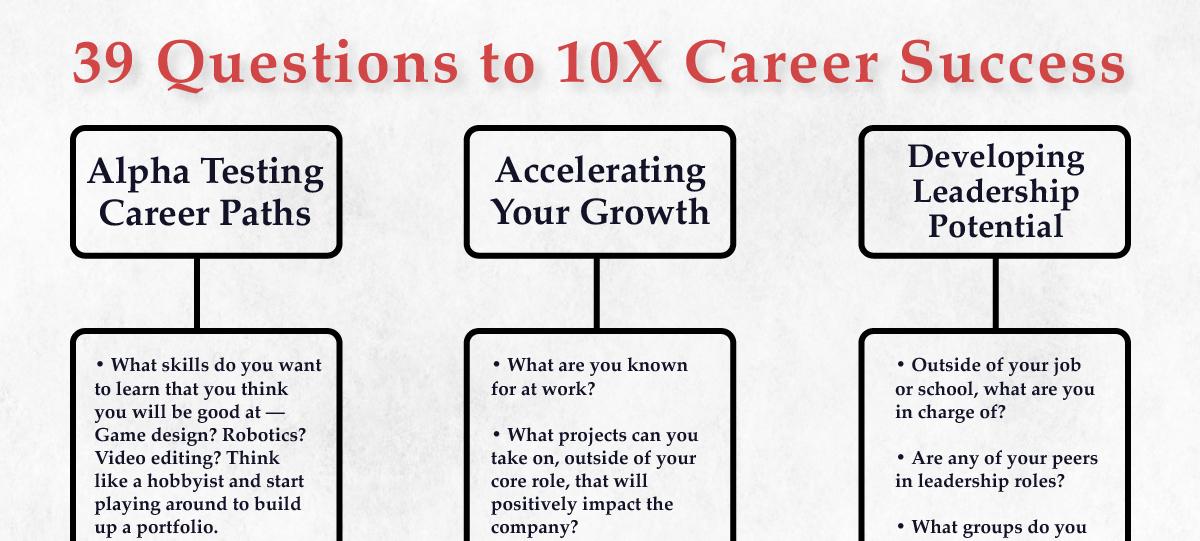

Maximizing learning and network
While some people appear to have overnight success in their careers, for most it takes a few tries to find fit in the right sector with good people.
At tech companies, the average employee tenure is about 3 years. Don’t panic if you’ve been in a few roles and jumped around a bit looking for fit. The good news is that you’ve probably developed critical expertise and hopefully have met a handful of truly excellent people. This includes startup Founders, who often start two or more companies before they get it right. There’s a reason we love Second-Time Founders.
If you’re feeling stuck in your career, remember my earlier advice — follow great people and follow momentum. But be aware that there are unique periods of enormous professional growth when companies are facing their toughest times. It’s a natural cycle that good companies go through tough times where momentum collapses — and it takes resilience, creativity, and focus to bring the organization out of it to build a great and enduring company. Speak to your peers and managers before thinking about moving on. If the long term prospects are strong and the company is executing well relative to its peers given the environment, then chances are you should stay the course.
Once you have found a sector and group of people that you enjoy, it’s time to speed up and maximize your career for learning and network, in order to get you on a leadership path.
1. Make yourself indispensable
Be a voracious and proactive learner, as early on as possible. One of my favorite interview questions is “How do you get smart on something quickly?” This can mean you read a book, you interview an expert, you watch a YouTube video. It doesn’t matter to me what method works for you; I just care that you have already learned this about yourself — that you’ve figured out how you work best to learn something at speed.
The key is that you think about how to learn and you actively are learning. This question reveals two critical factors for determining leadership potential: A learning mindset and self-awareness.
Fast learners are more likely to develop a unique skill set that is rare or irreplaceable at your company. If you can make yourself indispensable, you will be respected, paid well, and given opportunities to grow your career and your skills.
Once you start moving up into management positions, this advice flips. In the mid-stage of your career, you must then learn how to make yourself dispensable in places, by becoming a superior manager with great people skills and the ability to delegate well. If you’re particularly effective at something critical for the company, it’s okay to keep it in your hands. Still, your practical skills won’t be as important as your leadership skills.
2. Strengthen your network
Use this period of early-stage career growth to rapidly uplevel your network. First, learn to be amazing at internal (and external) communication. It’s one of the most overlooked and highest leverage areas for high-growth careers. Communicating well and often will earn you a reputation for getting things done. Communicating effectively with the leadership at your company will not only increase your exposure to them but will also open channels for hearing back from them, which accelerates learning.
Next, figure out who the “great” people are in your company (not just the executives), at partner companies, at competitors, and elsewhere in your sector. Talk, interact, and spend time with as many of them as you can. Invite them to participate in something — to be on your podcast, contribute insight for an essay, make a video, work on a project for them or with them. Figure out a way to be useful to them while you’re learning from them.
Accelerating your growth
Questions to help accelerate your growth in your first roles:
- What are you known for at work?
- What projects can you take on, outside of your core role, that will positively impact the company?
- Have you sought out constructive criticism from your boss?
- Who impresses you most at the company? Who would you model yourself after?
- Can people on your team get the job done well without you? (Tip: This can be a bad thing early on; but a good thing if you’re a manager.)
- How often are you communicating with the leadership at your company?
- Who can you mentor?
Developing a 10x leadership mindset
To grow a 10x career, it’s critical to develop your leadership skills. Some leadership talent is innate; some people just have the personality for it. Often, people absorb leadership skills along the way, picking it up first from their parents, mentors, coaches, and teachers, then from their first managers and the people they spend time with. But leadership is also a skill, which means it’s something that can be intentionally planned, practiced, and learned. There is a high causation between leadership and 10x careers.
Over the course of my own career, I’ve managed thousands of people and have interviewed a good number more. The patterns I have seen in A+ players is that they look at leadership as a mindset. Leadership is a practice, not a fixed state. And it’s not bestowed by a job title or by permission.
Don’t wait for someone to put you in charge of something. If you’re still in school or just starting out, create your own leadership experience whenever you can. Spend time as a captain of a sports team, an officer or president of a club (invent a club if you have to) or as an editor at a college paper. Lead a political campaign, start a non-profit, produce an event, launch a podcast.
Risk-taking is another great lifehack for developing leadership skills. Taking risks forces you outside of your comfort zone to try new things. You don’t need to take outsized risks at first. You could take small risks that cost no money but might feel uncomfortable, like learning a new language, publishing a newsletter, intentionally making new friends or going somewhere alone. You could stretch further by studying in a foreign country, traveling, starting a small business while at university, or performing in public.
The benefits of getting comfortable with risk are endless.
Lifehacks for learning leadership
These starter questions will help you develop your leadership potential. You don’t need a job or a title to get started.
- Outside of your job or school, what are you in charge of?
- Are any of your peers in leadership roles?
- What groups do you belong to, and what position do you hold?
- Have you ever gone on a trip by yourself?
- Have you organized an event for a large group of people?
- Have you been scared to ‘put yourself out there’ in some way in the last few months, but did it anyway?
- How many new people do you talk to each week?
- What have you taught someone else?
Starting A Chain Reaction
A chain reaction is a sequence of reactions, triggered by a core product or byproduct, that causes still more reactions. It’s a self-amplifying chain of events. This is the same physics that happens in 10x careers. When you combine a great network of people with a high-growth sector, and mix in your own learning and leadership mindset, you will spark a chain reaction that, eventually, will lead you to 10x success.
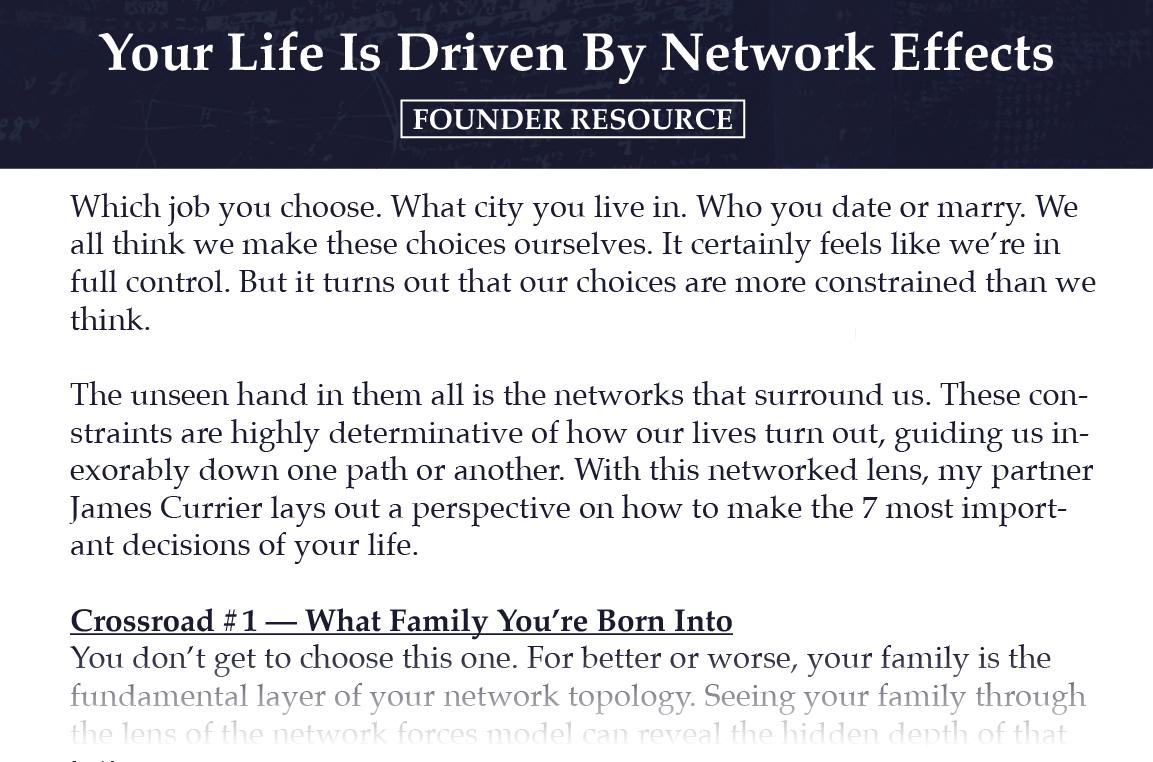

As Founders ourselves, we respect your time. That’s why we built BriefLink, a new software tool that minimizes the upfront time of getting the VC meeting. Simply tell us about your company in 9 easy questions, and you’ll hear from us if it’s a fit.
Try ChatNFX
